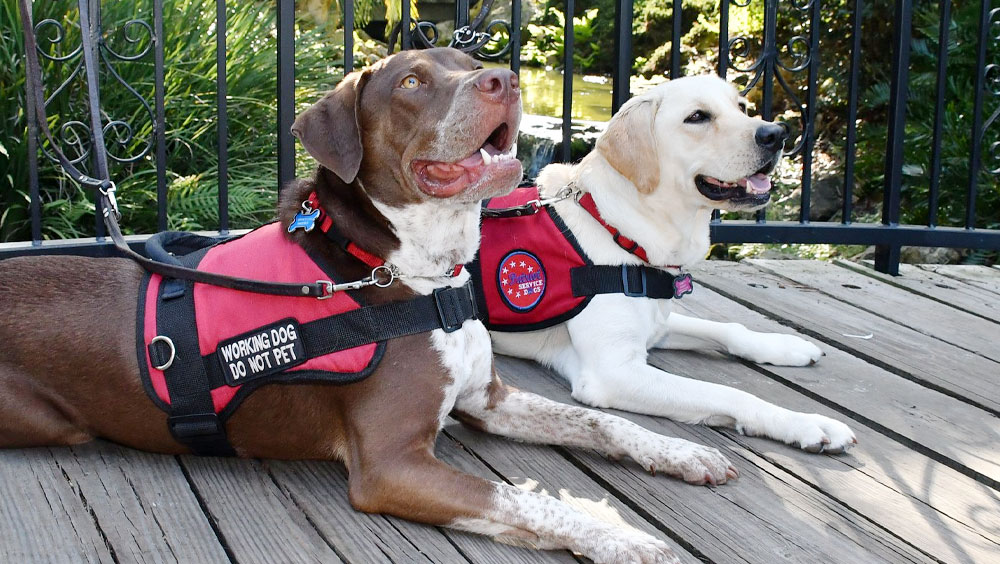Selecting the right service dog breed is crucial for individuals with disabilities or mental health challenges. These highly trained dogs can greatly improve the quality of life for their owners by assisting with a variety of tasks and providing emotional support. However, not all dog breeds are suitable for service work. It is important to choose a breed that possesses the right temperament, physical abilities, and intelligence to perform the required service tasks effectively.
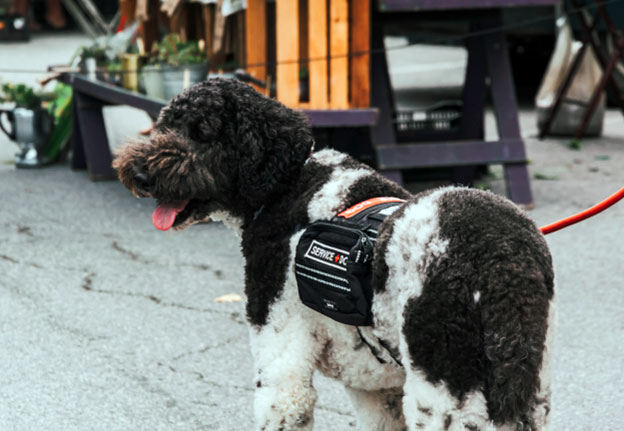
In this guide, we will provide insights into the best service dog breeds for different needs. Whether you require a service dog for mobility assistance, psychiatric support, or other specific tasks, we will explore the breeds that are known for excelling in these areas. Additionally, we will discuss the importance of proper training and the characteristics that make certain breeds excellent choices for service work.
By understanding the different breeds and their abilities, you can make an informed decision about the most suitable service dog breed for your specific needs. So let's dive in and discover the best service dog breeds for enhancing the lives of people with disabilities or mental health challenges.
Criteria for Selecting Service Dog Breeds
When it comes to selecting a service dog breed, there are several criteria that must be considered. These criteria will help determine whether a particular breed is suitable for the specific needs of an individual with disabilities or mental health challenges.
The most important criterion for selecting a service dog breed is their ability to follow instructions reliably and consistently. This is essential for the successful performance of tasks required by an individual with disabilities or mental health challenges. Certain breeds are known to have a greater inclination towards obedience, such as Labradors, Golden Retrievers, and Poodles. Other breeds may require additional training and reinforcement in order to learn commands and execute tasks accurately.
It is also important to consider a breed’s size and physical abilities when selecting the best service dog breed for an individual. Some tasks require larger breeds, such as retrievers, while smaller breeds may be more suitable for mobility assistance or psychiatric support.
Defining Service Dog Roles
Service dogs play crucial roles in assisting individuals with disabilities and providing them with support and independence. One common type of service dog is the guide dog, which helps people with visual impairments navigate their surroundings safely. These dogs are trained to guide their owners around obstacles, stop at curbs, and follow commands.
Therapy dogs are another type of service dog that plays a different role. Instead of assisting one specific individual, therapy dogs provide comfort and support to groups of people, such as those in hospitals, schools, or nursing homes. Their calm and friendly nature helps to improve the emotional well-being of those they interact with.
For individuals requiring service dogs, specific needs vary vastly. Some people may need mobility assistance dogs, which can perform tasks such as retrieving objects, opening doors, or providing balance support. Others may benefit from an emotional support dog that assists with mental health challenges. These dogs can help with behaviors associated with anxiety, PTSD, or other conditions.
No matter the role, service dogs are trained to be highly obedient, reliable, and responsive to their owner's needs. They are dedicated companions that help enhance the quality of life for individuals with disabilities.
Other Names For Service Dogs
Service dogs are sometimes referred to by different names depending on their role or area of expertise. Some common terms include assistance dog, guide dog, hearing dog, mobility dog, PTSD service dog, psychiatric service dog, and therapy dog. Each of these types of service dogs serves a different purpose and is trained accordingly.
Assistance dogs can be trained to help with a range of tasks, such as retrieving items, opening doors, and providing balance support. Guide dogs are used by individuals who are visually impaired. Hearing dogs assist those with hearing impairments by alerting their owners to sounds. Mobility dogs provide assistance to people who use wheelchairs or have difficulty walking. Psychiatric service dogs help mitigate the effects of mental health challenges like anxiety and PTSD.
Temperament and Training
When it comes to service dogs, a proper temperament is crucial. These dogs need to possess certain characteristics that enable them to perform their duties effectively. Key traits include intelligence, trainability, and a calm and friendly nature.
First and foremost, service dogs must be intelligent. They need to be able to understand and learn complex tasks quickly. This intelligence allows them to adapt to various situations and perform their duties efficiently. Additionally, a high level of trainability is essential. Service dogs must be responsive to their handler's commands and be able to perform tasks reliably and consistently.
Beyond intelligence and trainability, a service dog's temperament must also be calm and friendly. They need to remain composed and focused, even in stressful or chaotic environments. A service dog should be gentle and patient, especially when interacting with individuals who may have physical or mental disabilities.
In terms of training, service dogs undergo rigorous and specific training programs. They must be trained to perform tasks that benefit their handler's specific needs. This training includes obedience training, task training, and socialization. Obedience training ensures that the dog can respond to commands consistently. Task training involves teaching the dog to perform specific actions, such as retrieving objects or providing balance support. Lastly, socialization is crucial to ensure that the dog can interact appropriately with different people and environments.
Proper training is a fundamental aspect of service dog work. It provides the foundation for dogs to perform their duties reliably, safely, and efficiently. With consistent training, these remarkable animals can truly improve the quality of life for individuals with disabilities.
Grooming And Maintenance Needs
Grooming and maintenance needs are important factors to consider when choosing a service dog. Proper grooming and maintenance ensure that the dog is healthy and able to do its job. It also helps them look their best, creating a positive representation of service dogs.
In terms of grooming, most service dogs require at least weekly brushing to keep their coats free of tangles and debris. Brushing also helps to maintain their skin and coat health. Nail trimming is also necessary, as long nails can make it difficult for dogs to grip surfaces or perform certain tasks.
In terms of maintenance, service dogs need regular veterinary care. This includes vaccinations, parasite control, and routine examinations. Regular vet visits help ensure that the dog stays healthy and able to perform their duties effectively.
Health Concerns
Health concerns are important to consider when choosing a service dog. The right breed can help ensure that the dog is healthy and able to perform its job successfully. Certain breeds are more prone to certain health issues, so it is important to consider these when selecting a service dog.
Dogs with brachycephalic skulls, such as Bulldogs or Pugs, may have difficulty breathing, which can be exacerbated in stressful situations. Additionally, large breeds may suffer from joint and bone problems due to their size. It is important to research the health concerns that are common in certain breeds before making a decision.

Lifestyle Required
The lifestyle required of a service dog is demanding. Service dogs must be able to perform their duties consistently and reliably, regardless of the environment. This means that they need to stay calm in chaotic or stressful situations, such as crowded streets or loud noises. Additionally, they must always remain attentive and responsive to their handler’s commands.
To ensure this level of performance, service dogs require an active lifestyle. This includes regular exercise, mental stimulation, and socialization. Exercise helps keep the dog physically fit, while mental stimulation and socialization help them stay alert and focused.
The Top 6 Service Dog Breeds
Many different dog breeds have the potential to become excellent service dogs. Each breed has its unique strengths and characteristics that make them well-suited for this important role. Considerations for service dogs include intelligence, trainability, temperament, and health concerns. If you are considering getting a service dog, here are the top six breeds to consider:
Labrador Retriever
Labrador Retrievers are highly suitable for service work due to their exceptional qualities and abilities. They are intelligent, trainable, and have an innate desire to please their owners, making them an ideal choice for service dog work.
Labrador Retrievers excel in a variety of service tasks, particularly ones that require mobility assistance and guiding individuals with visual impairments. Their keen sense of smell allows them to locate and retrieve objects with remarkable precision. Additionally, their strong build and endurance enable them to provide stability and balance support to individuals with mobility challenges.
These loyal and reliable dogs are known for their friendly and gentle nature, making them excellent companions for people with disabilities. Their cheerful disposition and calm demeanor help create a strong bond between the dog and their handler.
Labrador Retrievers also possess impressive intelligence which allows them to perform complex tasks such as opening doors, turning on lights, and alerting their handlers to potential dangers.
Overall, Labrador Retrievers are a popular and excellent choice for service dog work due to their combination of intelligence, trainability, and strong work ethic. Their ability to provide assistance and support enhances the quality of life for individuals with physical disabilities or visual impairments, making them indispensable companions and service animals.
Golden Retriever
Golden Retrievers are another popular choice for service dog work due to their exceptional qualities and temperament. These dogs are highly trainable, intelligent, and eager to please, making them excellent candidates for various service tasks.
One of the main reasons Golden Retrievers are well-suited for service work is their friendly and gentle nature. They are known for their patient and tolerant attitude, which makes them ideal companions for individuals with disabilities. Their calm and affectionate demeanor helps create a strong bond with their handler, providing emotional support and improving the handler's overall quality of life.
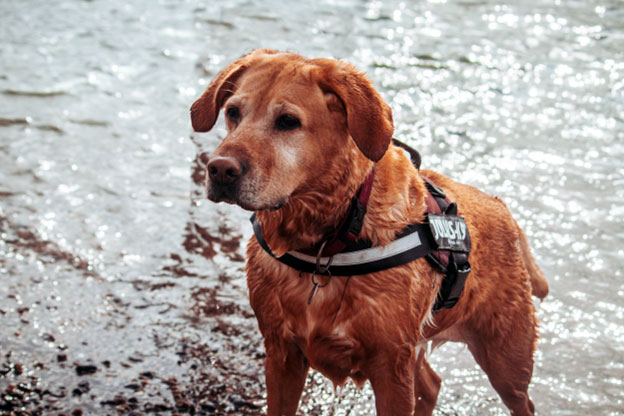
Golden Retrievers also excel in tasks that require emotional support and assistance. They have a keen sense of empathy and are able to sense and respond to their handler's needs. Whether it's detecting anxiety or providing comfort during a panic attack, Golden Retrievers are able to provide a calming presence and offer support in various mental health challenges.
Furthermore, their intelligence and willingness to learn make them adept at tasks such as retrieving medication, opening doors, or assisting with mobility. Their versatility and adaptability enable them to provide assistance to individuals with both physical and mental disabilities.
German Shepherd
The German Shepherd is a highly versatile breed that excels in various service roles. Their intelligence and trainability make them perfect candidates for tasks that require complex problem-solving and obedience training. They are known for their ability to quickly learn and master new commands, making them excellent choices for service dog training.
One of the standout characteristics of the German Shepherd is their strong protective instincts and loyalty. This breed is naturally inclined to form strong bonds with their handlers, making them highly devoted and dedicated service dogs. Their protective nature allows them to be vigilant and alert to their handler's needs, ensuring their safety and security.
German Shepherds are often used as police dogs due to their exceptional sense of smell and tracking abilities. They are capable of detecting hidden drugs, explosives, and even missing persons. These skills also make them excellent choices for tasks such as alerting their handlers to changes in blood sugar levels for individuals with diabetes.
Their athletic build and strength enable them to assist with mobility tasks, such as opening doors, pulling wheelchairs, or providing stability while walking. German Shepherds are also well-suited for tasks involving retrieving objects and performing physical tasks for people with disabilities.
In summary, the German Shepherd's versatility, protective instincts, loyalty, and intelligence make them exceptional service dogs. They are able to perform a wide range of tasks and provide invaluable support to individuals with various physical and mental disabilities, enhancing their independence and quality of life.
Poodle
Poodles are renowned for their impressive intelligence and hypoallergenic qualities, making them a popular choice for service dog roles. Their high level of intelligence allows them to quickly learn and execute complex tasks, making them highly capable service animals.
In addition to their intelligence, Poodles have non-shedding, curly coats that are hypoallergenic. This makes them suitable for individuals with allergies as they produce less dander and shed less hair. Their hypoallergenic quality allows them to be in close proximity with individuals who have sensitive allergies, without causing discomfort or allergic reactions.
Poodles are often chosen for medical alert roles due to their keen sense of smell and ability to detect changes in their handler's health. They can be trained to recognize and respond to medical emergencies, such as alerting their handlers to low or high blood sugar levels, or detecting seizures and migraines before they occur. With their sensitive noses, Poodles are highly adept at picking up on subtle changes in scent, allowing them to provide valuable assistance and potentially life-saving alerts.
Overall, Poodles excel in their intelligence and hypoallergenic qualities, making them an excellent choice for individuals in need of service dogs for medical alert roles. Their combination of intelligence, non-shedding coats, and ability to detect health issues make them outstanding service animals that can greatly enhance the quality of life for their handlers.
Border Collie
Border Collies are renowned for their energy and agility, making them an excellent choice for service dog roles that require physical prowess. They have an incredible amount of energy, which allows them to keep up with the demands of their tasks and provide assistance with ease.
Due to their agile nature, Border Collies excel in tasks that require precision and coordination. They have a natural ability to move quickly and gracefully, which is essential for performing complex tasks such as guiding individuals with mobility challenges or assisting in search and rescue operations. Their exceptional athletic abilities enable them to navigate various terrains and obstacles without hesitation.
In addition to their physical capabilities, Border Collies have high levels of intelligence and trainability, making them quick learners and reliable workers. Their intelligence allows them to understand complex instructions and perform tasks with accuracy and efficiency. Their trainability ensures that they can be easily taught new skills and tasks, making them adaptable for a wide range of service dog roles.
Furthermore, Border Collies are highly focused and have excellent problem-solving skills. These traits make them ideal for tasks that require attention to detail, such as assisting individuals with psychiatric or medical conditions. Their ability to stay attentive and alert to their handler's needs enables them to provide the necessary support and assistance.
In summary, the Border Collie's energy, agility, intelligence, and problem-solving skills make them an exceptional choice for service dog roles that require precision and physical abilities. Their dedication and willingness to work make them invaluable companions for individuals with various disabilities, helping to enhance their quality of life and independence.

Boxer
Boxers are a popular choice for service dog breeds due to their strength and protective nature. They are known for their muscular build and powerful jaw, which makes them excellent for tasks that require physical strength and protection. Boxers have a strong sense of loyalty and are dedicatedto their handlers, making them reliable partners for individuals with disabilities.
One area where Boxers excel as service dogs is in mobility assistance. Their strong physique enables them to provide support and stability to individuals with mobility challenges. With proper training, Boxers can be taught to perform tasks such as retrieving objects, opening doors, and assisting their handler in maintaining balance while walking. Their size and strength also allow them to provide stability during transitions, such as standing up from a seated position or getting in and out of vehicles.
Boxers are not only physically capable but also highly intelligent and trainable. They have a natural inclination to please their owners, making them eager learners. With consistent and positive reinforcement training, Boxers can easily adapt to new tasks and commands. This makes them suitable for a variety of service dog roles, including those that involve complex tasks such as alerting their handler to medical conditions or providing assistance in emergencies.
In conclusion, Boxers possess the strength, protective instinct, and intelligence necessary to make excellent service dogs. Their potential as mobility assistance service dogs, combined with their loyal and trainable nature, makes them a popular choice for individuals with disabilities seeking a service animal to enhance their quality of life.
Types of Service Dogs: A Comparison
When choosing a service dog, it’s important to understand the differences between breeds and the tasks they are best suited for. Border Collies and Boxers are two of the most popular breeds for service work due to their physical capabilities, intelligence, and trainability. Both breeds have distinct characteristics that make them suitable for certain roles, but there are also some distinctions between them that should be taken into consideration.
Border Collies are known for their intelligence and trainability, which make them ideal for tasks that require accuracy and precision. Their agility and problem-solving skills make them suitable for mobility assistance roles, whereas their energy and focus make them well-suited to medical alert tasks.
Boxers, on the other hand, are best known for their strength and protective nature, which makes them well-suited for mobility assistance roles as well. Additionally, their intelligence and eagerness to please make them excellent candidates for tasks that require complex commands or high-level alertness such as responding to medical emergencies.
Ultimately, both breeds have the potential to become excellent service dogs depending on their individual traits and the tasks they are trained for. It’s important to consider the unique qualities of each breed to determine which one is the best fit for your individual needs.
Costs Of Different Service Dogs
The cost of owning a service dog can vary greatly depending on the breed and the type of service they are trained to provide. Generally speaking, larger breeds such as Boxers tend to be more expensive than smaller breeds due to their size and the specialized training they require. Additionally, certain services such as medical alert or mobility assistance may require additional training and equipment, which can increase the cost significantly.
Which Service Dog Breed Is Best For First-Time Owners?
For first-time service dog owners, a smaller breed such as a Poodle or a Miniature Schnauzer may be the best choice. These breeds are often easier to train and require less specialized equipment than larger breeds. Additionally, they tend to have lower exercise requirements due to their size, making them better suited for those who need assistance with mobility or are unable to provide extensive exercise.
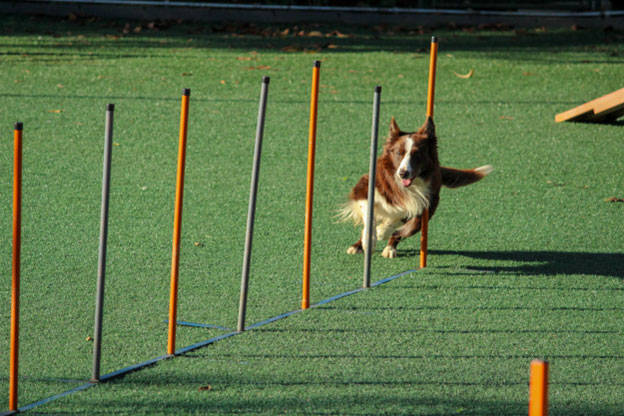
Having Multiple Service Dogs For Different Needs
For individuals with multiple disabilities or medical conditions, having multiple service dogs can be beneficial. Having two or more service dogs allows them to meet their needs in different ways. For example, they may have one dog trained to alert them to seizures and another trained to help with mobility.
This can give them the freedom and independence they need to get around safely and comfortably. Additionally, having multiple service dogs can provide companionship and emotional support, which can be beneficial for those with psychological disabilities.
Sociable Service Dog Breeds
Sociable service dog breeds are ideal for those who need their canine companion to provide emotional support in addition to physical assistance. These breeds tend to be friendly, outgoing, and eager to please, making them perfect for providing companionship and forming strong bonds with their owners. Breeds such as Labrador Retrievers, Golden Retrievers, and German Shepherds are well-known for their sociable nature, and they make excellent service dogs.
The most stranger-friendly breed out of these is the Golden Retriever, which is also highly trainable and eager to please. These qualities make them perfect for providing assistance with tasks that require precision and accuracy.
Benefits Of Service Dogs
Service dogs can bring many physical, emotional, and psychological benefits to individuals with disabilities. The presence of a service dog can provide comfort and companionship, as well as aid in tasks that would otherwise be difficult or impossible for the individual to accomplish.
They can offer physical support by helping with balance and stability while walking and providing mobility assistance, such as retrieving objects or opening doors. Furthermore, they can alert their handler to medical conditions such as low blood sugar or seizures, and provide comfort during episodes.
In addition to the physical benefits, service dogs can also improve emotional well-being by providing companionship and reducing social isolation. They can also offer psychological support by providing safety and security in public places, aiding with daily activities, and serving as a constant source of support for individuals with disabilities.
How To Get A Service Dog
If you are considering getting a service dog, the first step is to consult with your physician or mental health professional to determine if a service animal is appropriate for your needs. Once you have decided that a service dog is the right choice for you, there are several steps to take in order to acquire one.
The first step is to identify an organization that provides service animals and contact them to discuss your needs and determine whether they offer a program that is suitable for you. Additionally, many organizations will require an application and an interview process in order to ensure that the animal is a good fit for you.
Once you have been accepted into the program, you will need to arrange for training for the animal as well as yourself. Depending on the type of service dog you are acquiring and your individual needs, the process can take anywhere from a few weeks to several months.
Why You Should Consider Getting A Service Dog
Service dogs can provide a variety of benefits to people with a wide range of disabilities or medical conditions. Those who are blind, deaf, have mobility issues, suffer from seizures or chronic pain, have autism spectrum disorder, or post-traumatic stress disorder may benefit from having a service dog. Additionally, those with psychological conditions such as anxiety and depression may also find value in having a service dog to provide companionship and emotional support.
In conditions such as PTSD, service dogs can provide safety and security by alerting their handler to the presence of strangers, noises, or changes in the environment. They can also assist with activities such as shopping, going to appointments, or simply providing companionship.
A service dog can make an incredible difference in the life of a person with a disability or medical condition. If you are considering getting a service dog, it is important to do your research and choose an organization that is best suited for your needs.
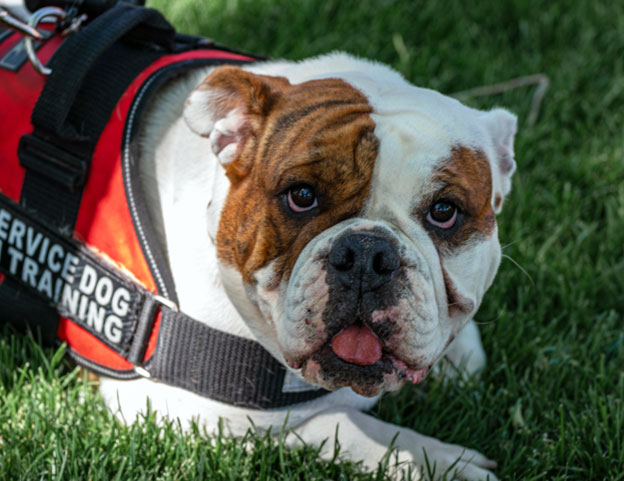
Best Mobility Dogs
The best type of service dog for mobility assistance is typically a larger breed such as a Labrador Retriever, Golden Retriever, or German Shepherd. These breeds are strong and have the capacity to pull wheelchairs or carry items. Additionally, they tend to be more patient and gentle, which is important when working with individuals with disabilities. Mobility dogs are highly trained to assist with physical tasks such as picking up dropped objects, opening doors, and providing balance support.
Best Hearing Dogs
For individuals who are deaf or hard of hearing, the best type of service dog is typically a smaller breed such as a Poodle, Miniature Schnauzer, or Cocker Spaniel. These dogs are alert and have a strong sense of hearing, making them ideal for detecting sounds that their handler may not be able to hear. They can alert their handler to a knock at the door, a ringing telephone, or an alarm clock.
Best Medical Alert Dogs
For those who need assistance with medical alerts, smaller breeds such as a Poodle or Miniature Schnauzer may be the best choice. These breeds are often easier to train and require less specialized equipment than larger breeds. Additionally, they tend to have lower exercise requirements due to their size, making them better suited for those who need assistance with mobility or are unable to provide extensive exercise.
Best Emotional Support Dogs
For those seeking emotional support, breeds such as the French Bulldog and Greyhound may be ideal. These breeds are known for their affectionate and calming nature, making them well-suited for providing comfort in times of distress. Furthermore, they tend to be low maintenance and require minimal exercise, which can be beneficial for those who have difficulty with mobility.
Best Therapy Dogs
Therapy dogs offer a unique type of service, providing comfort and emotional support to those in need. For this purpose, breeds such as the Golden Retriever or Labrador Retriever are often the best choice due to their gentle and friendly nature. These breeds tend to be highly trainable and respond well to commands, making them well-suited for completing tasks in therapy sessions. Additionally, they are large enough to provide physical support when needed.
Best All-Around Service Dogs
The choice of a service dog is very personal and depends on the individual needs of the person. For those who need assistance with a variety of tasks, an all-around breed such as the Border Collie or Standard Poodle are good service dogs. These breeds are highly intelligent and have a wide range of abilities, making them well-suited for a variety of tasks. Additionally, they are loyal and have the capacity to learn quickly, making them ideal for those who need assistance with multiple tasks.
Conclusion: The Right Service Dog for You
Selecting the right service dog breed is crucial for ensuring a successful partnership and meeting specific needs. While Boxers excel in mobility assistance, there are several other breeds that are well-suited for various roles.
Labrador Retrievers and Golden Retrievers are popular choices for service dogs due to their gentle nature, impressive intelligence, and strong bond with their handlers. They are capable of performing a wide range of tasks, including retrieving objects, opening doors, and providing emotional support.
For individuals with psychiatric service dog needs, breeds such as the Standard Poodle and the Bernese Mountain Dog are excellent choices. These gentle giants are known for their loving nature and can provide both physical and emotional support.
French Bulldogs are a fantastic choice for individuals with limited mobility and those who may need assistance with tasks like retrieving items and opening doors. Despite their smaller size, these dogs are highly trainable and can make a positive impact on the quality of life for those in need.
It is essential to seek guidance from professionals when selecting a service dog. They can provide valuable insights into breeds that best match specific needs, ensuring a successful and fruitful partnership. Consideration should be given to factors such as temperament, size, and individual health concerns when making a decision. By doing so, individuals can find the perfect service dog breed that will greatly enhance their independence and well-being.

Frequently Asked Questions
Can any dog become a service dog, or are there specific breeds for this role?
While any dog has the potential to become a service dog, certain breeds are better suited for this role due to their temperament, intelligence, and physical abilities. Breeds like Labrador Retrievers, Golden Retrievers, Standard Poodles, and Bernese Mountain Dogs are commonly chosen for service work because they possess the necessary qualities to excel in this field.
How do I know which service dog breed is best for my medical condition or needs?
Selecting the right service dog breed depends on your specific medical condition and needs. For individuals with mobility challenges, breeds like Boxers, Labrador Retrievers, and Golden Retrievers are often recommended. If you require emotional support or have psychiatric needs, breeds like Standard Poodles and Bernese Mountain Dogs are a good fit. It's best to consult with a professional service dog trainer or organization to determine the most suitable breed for your unique situation.
Do service dog breeds differ in terms of their lifespan and health concerns?
Yes, service dog breeds can vary in terms of lifespan and health concerns. Generally, larger breeds like Bernese Mountain Dogs have a shorter lifespan and may be more prone to certain health issues. On the other hand, breeds like Labrador Retrievers and Golden Retrievers are known for their overall good health and longer lifespans.
What is the typical training process for a service dog, regardless of breed?
The training process for service dogs involves several stages, including basic obedience training, socialization, and specific task training. The training is extensive and can take up to two years or more. It is usually conducted by professional service dog trainers who use positive reinforcement techniques to teach the dogs the necessary skills and behaviors to assist their handlers.
Can I adopt a rescue dog and train it to be a service dog, or should I choose a specific breed?
It is possible to adopt a rescue dog and train it to be a service dog, but it can be more challenging compared to working with a specific breed that is known for its suitability as a service dog. Rescue dogs may have unknown backgrounds and temperament issues that might hinder their training. However, with the help of an experienced trainer, some rescue dogs can successfully be trained to fulfill the role of a service dog. Ultimately, the decision depends on individual circumstances and the dog's individual temperament and capabilities.
How do service dogs realize that their owner is in trouble?
Service dogs are trained to recognize when their owner is in distress or potential danger. They may be taught to respond to verbal cues such as “help”, “danger”, or “alert” and take appropriate action by leading their handler away from a hazardous situation, seeking help from nearby people, or providing physical assistance. Additionally, service dogs may be trained to recognize changes in their owner’s body language, breathing, or temperature that may indicate a need for help.
Overall, selecting the right service dog breed is a highly personal decision that depends on your individual medical condition and needs. While any breed can become a service dog, certain breeds are well-suited for this role due to their temperament, intelligence, and physical abilities. Ultimately, it’s important to consult with a professional service dog trainer or organization to determine the most suitable breed for your unique situation.

